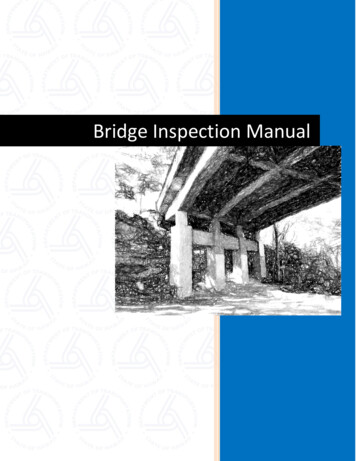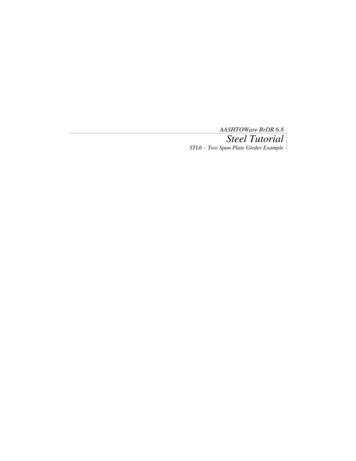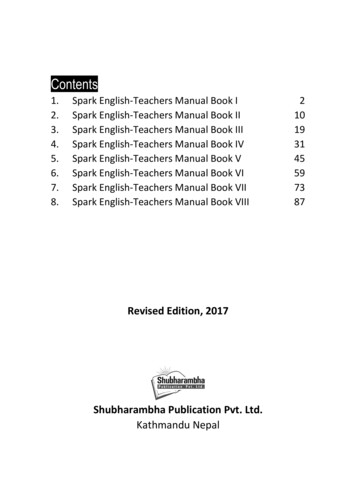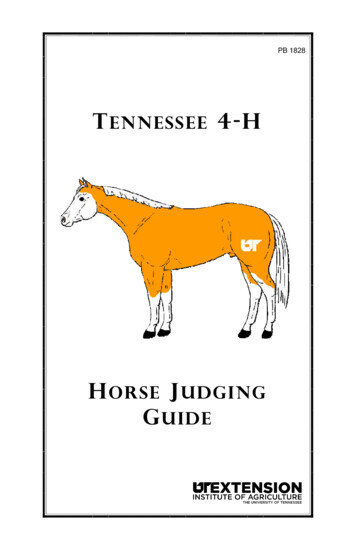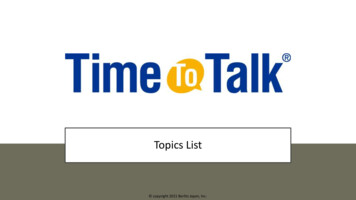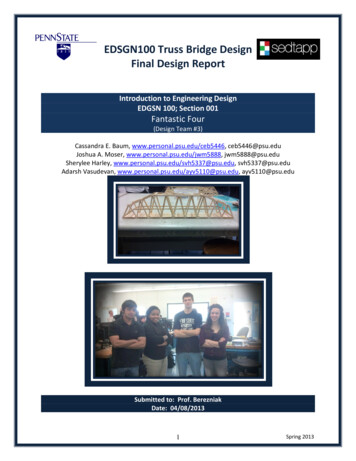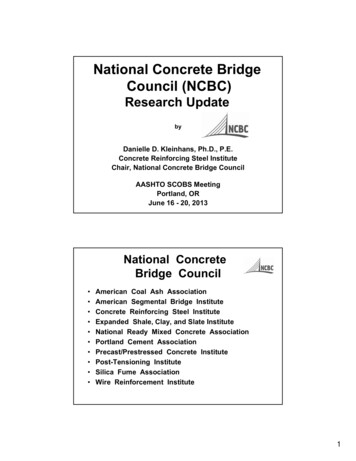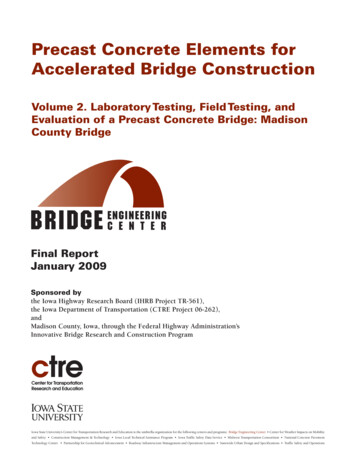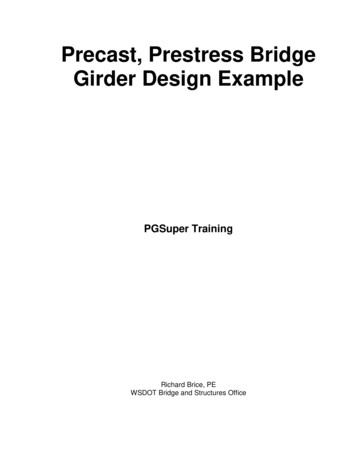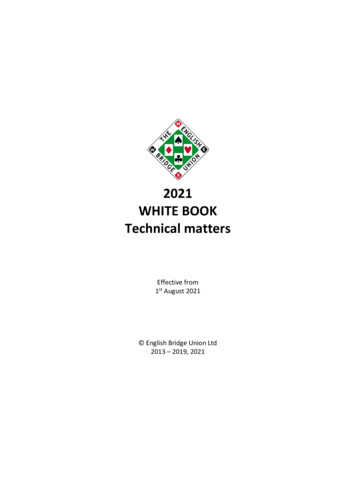
Transcription
2021WHITE BOOKTechnical mattersEffective from1st August 2021 English Bridge Union Ltd2013 – 2019, 2021
White Book – 566ADVICE FOR PLAYERS7Calling the TDDisclosureAlerting and AnnouncementsPsychic BiddingBest Behaviour at BridgeProceduresAppealsAppeal ProceduresRegulation of .922.12.22.32.42.52.62.72.8REGULATIONSREGULATIONS – SCORING484851586363656669SCORE CALCULATIONS AND IMPLEMENTATIONAdjusting ScoresMethods of Scoring55.15.25.32930313336384143Victory Point ScoringSplit-tie ProceduresUnplayable BoardsTriangular MatchesMismatches in Swiss eventsAssigning in Swiss teamsScoring in Teams of Eight or moreCarry-forward Score Formula44.14.229Accommodating Disabled PlayersApplication within England of the WBF Code of PracticeReplacement of PlayersWithdrawals and Late or Non-arrivalTime Limits – Correction PeriodMatches Played PrivatelyCaptain’s Duties and RightsSchedule of Standard dgementsOther Tournament EN REGULATIONS83WBF/EBL Screen RegulationsOther screen regulationsAPPENDIX – WBF Alerting Policy83858522 July 2021ii
White Book – Contents66.16.26.3ADVICE FOR TOURNAMENT ORGANISERS878989TOURNAMENT DIRECTORS9177.17.27.37.47.57.687Advice on Scoring TournamentsDisciplinary MattersFacilities for Disabled Bridge PlayersTournament Directors Code of ConductRole of the TDRole of the ScorerDirector in Charge (DIC)Appeal and Report of Hand formsRole of the Club TD89193100101103105LAWS106DefinitionsLaw 1 The Pack – Rank of Cards and SuitsLaw 4 PartnershipsLaw 5 Assignment of SeatsLaw 6 The Shuffle and DealLaw 7 Control of Board and CardsLaw 9 Procedure Following an IrregularityLaw 10 Assessment of rectificationLaw 11 Forfeiture of the right to rectificationLaw 12 Director’s discretionary powersLaw 13 Incorrect Number of CardsLaw 14 Missing cardLaw 15 Play of a wrong boardLaw 16 Authorised and unauthorised InformationLaw 20 Review and Explanation of CallsLaw 21 Call Based on MisinformationLaw 22 Procedure after the bidding has endedLaw 23 Comparable CallLaw 24 Card Exposed or Led Prior to Play PeriodLaw 25 Legal and Illegal Changes of CallLaw 26 Call Withdrawn, Lead RestrictionsLaw 27 Insufficient BidLaw 29 Procedure after a Call out of RotationLaw 40 Partnership UnderstandingsLaw 41 Commencement of PlayLaw 42 Dummy’s RightsLaw 43 Dummy’s LimitationsLaw 45 Card PlayedLaw 46 Incomplete or Erroneous Call of Card from DummyLaw 47 Retraction of Card PlayedLaw 50 Disposition of a Penalty CardLaw 58 Simultaneous Leads or PlaysLaw 61 Failure to Follow Suit – Inquiries Concerning a RevokeLaw 63 Establishment of a RevokeLaw 64 Procedure after Establishment of a RevokeLaw 67 Defective TrickLaw 68 Claim or Concession of TricksLaw 69 Agreed Claim or ConcessionLaw 70 Contested claim or concession22 July 132133133133134134135135
White Book – ContentsLaw 71Law 72Law 73Law 75Law 76Law 78Law 79Law 80Law 81Law 82Law 85Law 86Law 87Law 90Law 91Law 92Law 93Concession CancelledGeneral PrinciplesCommunicationMistaken Explanation or Mistaken CallSpectatorsMethods of scoring and Conditions of ContestTricks WonRegulation and OrganisationThe DirectorRectification of Errors of ProcedureRulings on Disputed FactsIn Team Play or SimilarFouled BoardProcedural PenaltiesPenalise or suspendRight to AppealProcedures of appealINDEX22 July 50150152iv
White Book – Introduction0 Introduction0.1GeneralThis book (the White Book) consists of EBU regulations and interpretations. It is written for theLaws of Duplicate Bridge (2017). The White Book and the Blue Book are adjuncts to the laws andeach other: more technical matters are here in the White Book.The White Book contains current EBU regulations (other than those in the Blue Book), EBUinterpretations of the laws, and general guidance for players, Tournament Directors, AppealsCommittees, Tournament Organisers and scorers. These should be useful in all events whetherthe EBU is the Tournament Organiser or not.The Laws of Bridge are written and promulgated by the World Bridge Federation’s LawsCommittee (WBFLC). Minutes of their meetings often contain interpretations and explanationsof various laws, and the EBU’s understanding of those minutes is included in separate sectionsthroughout the ‘Laws’ part, citing the relevant WBFLC minute. These sections are labelled[WBFLC]. On occasion, the L&EC has given different advice and expects this to be followed.Minutes from WBFLC meetings before the 2017 Laws may still apply: they are included but theLaw references are updated.Online bridge organised by the EBU is subject to the EBU Sky-Blue Book – Supplement to the BlueBook and White Book for online bridge; first issued in May 2020. It is planned to bring togetherregulations for online bridge and face-to-face bridge – meanwhile the Sky-Blue Book continuesto apply to online bridge.There was no White Book published in 2020. This edition in 2021 contains amendments startingfrom late 2019: in the drafts (including the final draft), significant changed text is marked in themargin.0.2AcknowledgementsThis White Book is published by the L&EC. However, there are many other people who havegiven freely of their time, including the previous and current editors, to assist in proofreading,checking for accuracy and making suggestions.0.3Other Tournament OrganisersFor events not sponsored by the EBU, the L&EC recommend that the Tournament Organiseradopt these regulations; but the Tournament Organiser may make its own regulations if they sodesire.0.4ContactsThe EBU Laws and Ethics Committee (L&EC) hopes you find the document useful: if you haveany comments or queries, please address them to the current editor: Robin Barker (Deputy ChiefTD), email robin@ebu.co.uk, telephone: 01296 317223.Official correspondence for the committee should be addressed toThe Secretary, Laws and Ethics CommitteeEnglish Bridge Union, Broadfields, Bicester Road, AYLESBURY, HP19 8AZTelephone: 01296 317219Email: lecsec@ebu.co.ukThe Laws and Ethics page on the EBU website has this White Book, the Blue Book and updatesthereto, links to the laws, telephone numbers of EBU TDs and Referees, forms for TDs, and otheruseful items for TDs and Appeals Committees: http://www.ebu.co.uk/laws-and-ethics/.EBU Tournament Directors can assist with rulings and other enquiries; the EBU diary also hascontact details.22 July 20215
White Book – Introduction0.5NumberingParts, and sections within them, are numbered sequentially; except subsections in the ‘Laws’part are numbered according to the law number to which they refer. References to thisdocument are shown as ‘§’, followed by the section number: in electronic versions of thisdocument these references should work as hyperlinks.0.6AbbreviationsThe following abbreviations are used in this document0.6.1Bridge organisations and committeesEBUL&ECWBFWBFLC0.6.2English Bridge Union(EBU) Laws and Ethics CommitteeWorld Bridge FederationWorld Bridge Federation’s Laws CommitteeOfficialsDICDirector in ChargeTDTournament DirectorWhen ‘DIC’ is used rather than ‘TD’ this is a reference to powers that the DIC does not expectto delegate to assistants.0.6.3Scoring methodsIMPMPVP0.6.4Artificial scoresAVEAVE AVE 22 July 2021International Match PointMatch PointVictory Pointaverageaverage plusaverage minus6
White Book – Players1 Advice for Players1.1Calling the TDWhen attention is drawn to an irregularity, players are required to call the TD. The right toredress may be lost if the TD is not called promptly. (Law 9B1 (a))A player may call the TD when they think their side’s rights might have been damaged; the playerdoes not have to be sure. Players should refrain from casting aspersions on another playerbecause of a call for the director.Although there are circumstances in Law 16B2 where a player may ‘reserve their rights’, it isusually better to call the TD. This assumes there is a non-playing TD to be called. In the case of aplaying TD, or no TD (as in a match played privately), a player may have no choice but to reservetheir rights.In practice failure to call the TD is often not fatal. If the four players at the table agree that therewas a hesitation, and all four are experienced and know their rights, then leaving it to the endof play to see if there is any potential damage does not matter.However, it is very important to call the TD immediately when:(a)a player doesn’t answer questions about the meaning of a call (or play);(b)a player corrects any information they or their partner has given;(c)there is conflicting information about the meaning of a call or play;(d)there is an insufficient bid;(e)there is a lead, play or call out of turn;(f)there is a defender’s exposed card;(g)there is a dispute over a claim;(h)there is any bad behaviour.Note In (b), the player making the correction should call the TD: Law 20F4 (a) and Law 20F5 (b). This includes saying that a call should or should not have been alerted. The TD should be called even if it was not permitted for the player to makesuch a correction (if Law 20F5 (b) (ii) applies). If the side making the correction do not call the TD, the other side should callthe TD if they may want to change their last call, see §8.21.1.(c) applies when an explanation is different from the system card – even if it is clear whichexplanation is correct there may have been misinformation or unauthorised information.1.2DisclosureSome pairs have system files. It is open to TDs and Appeals Committees whether to acceptevidence from such files.1.3Alerting and Announcements1.3.1GeneralAlerts should be made by use of the Alert card. When not using bidding boxes, alert by tappingthe table; or say “alert”. The alerting player must make all reasonable efforts to ensure thatboth opponents are aware of the alert. (EBU Blue Book, section 4A8)Always use a consistent form of wording when announcing.22 July 20217
White Book – PlayersGeneral bridge inferences, like those a new partner could make when there had been nodiscussion beforehand, are not alertable. However, penalty doubles of natural suit bids below3NT (identified by general bridge inference) must be alerted even if there has been no discussionor agreement.A player must alert any inferences drawn from partnership experience or practice which have apotentially unexpected meaning. A call with an alertable meaning arising from an implicitunderstanding must be alerted.A player who is not sure whether or not a call made is alertable should alert it. If there is nopartnership understanding about the meaning of the call, the player should say so rather thansay how is going to treat it.1.3.2Misinformation and damageA player’s claim to have been damaged because the opponents failed to alert or announce a callwill fail if the player was aware of its likely meaning, and they had the opportunity to ask withoutputting their side’s interests at risk. The player’s awareness of the likely meaning will depend ontheir experience.1.4Psychic Bidding1.4.1GeneralA psyche or psychic bid is a deliberate and gross mis-statement of honour strength and/or suitlength. A misbid is an inadvertent mis-statement of honour strength and/or suit length. Adeviation is a deliberate but minor mis-statement of honour strength and/or suit length.A psychic bid is a legitimate ploy as long as it contains the same element of surprise for thepsycher’s partner as it does for the opponents.Systemic psyching of any kind is not permitted. A partnership may not use any agreement tocontrol a psyche. For example, if you play that a double of 3NT asks partner not to lead the suityou have bid, you may not make such a double if the earlier suit bid was a psyche.Players are required to disclose their agreements, both explicit and implicit. If a player believes,from partnership experience, that partner may have deviated from the system this must bedisclosed to the opponents. If a player properly discloses this possibility, the player will not bepenalised for fielding it, although there may be a penalty for playing an illegal method.Frivolous psyching, for example suggesting a player has lost interest in the competition, is abreach of the laws. (Law 74A2, Law 74B1, Law 74C6).There is not an EBU regulations that a player may not psyche a game-forcing or near gameforcing artificial opening bid.1.4.2Fielding1.4.2.1Red PsycheThe actions of the psycher’s partner following a psyche – and, possibly, further actions by thepsycher – may provide evidence of an undisclosed, and therefore illegal, understanding. If so,then the partnership is said to have ‘fielded’ the psyche. The TD will judge actions objectively bythe standards of a player’s peers; that is to say intent will not be taken into account.As the judgement by the TD will be objective, some players may be understandably upset thattheir actions are ruled to be fielding. If a player psyches and their partner takes action thatappears to allow for it then the TD will treat it as fielding.A partnership’s actions on one board may be sufficient for the TD to find that it has a concealedpartnership understanding (CPU) and the score will be adjusted in principle (see §1.4.4). This isclassified as a red psyche22 July 20218
White Book – Players1.4.2.2Amber PsycheA TD may find that whilst there is evidence of a CPU it is not sufficient, of itself, to justify anadjusted score. This is classified as an amber psyche. In particular, if both partners psyche on thesame hand, then a classification of at least amber is likely to be justified.1.4.2.3Green PsycheIn the majority of cases the TD will find nothing untoward and classify it as a green psyche.1.4.2.4Psyches on two or more boardsA TD may use evidence from a partnership’s actions on two or more boards to assess apartnership’s understandings. Whilst a single instance may not provide sufficient evidence of aCPU to warrant a score adjustment, a repetition reinforces the conclusion that one exists. Inother words, if two similar psyches are classified as amber, the classification of bothautomatically becomes red, and the score on all such boards within that session is adjustedaccordingly.1.4.2.5DeviationsA partnership’s actions following a deviation may provide evidence of a CPU, but they are lesslikely to do so than after a psyche. As with psyches, deviations may be classified as red, amberor green.1.4.2.6MisbidsA partnership’s actions following a misbid may provide evidence of a partnership understandingwhich should have been properly disclosed. Unlike psyches, misbids are not classified as red,amber or green, but can be recorded.Because of the difference between the player’s understanding of their call and any alerts andanswers to questions by their partner it is quite common for unauthorised information problemsto be present.1.4.3Reporting and RecordingPsychic bids do not have to be reported but a player may request the TD to record them. To doso is not to accuse the opponents of malpractice. The TD may record any hand if they think fit.Players whose partners have taken an unusual action such as a psyche, deviation or misbid whichhas been reported are given the chance to explain their actions in writing. This is because it isthat player whose subsequent bidding and play is being looked at. Such players who do notexplain their actions must realise that failure to do so might lead to unfortunate conclusions.Notably, players who fail to raise partner in such circumstances and do not explain their actionsmust expect their actions to be adjudged as fielding.1.4.4Scoring a Fielded Psyche or DeviationIf the TD judges a psyche or deviation is amber or green, then there is no adjustment, unlessthere are two amber cases, see §1.4.2.4.After the board is completed the TD may judge a psyche or deviation is red. If their opponentshave a 60% score or better, or have gained 3 IMPs or more, the result stands unchanged.Otherwise, the result is cancelled, and the board re-scored as average plus to the opponents,average minus to the pair. Normally this translates as 3 IMPs, or 60%/40%.If it is a red psyche then an additional procedural penalty will be applied. Normally it will be thestandard penalty though a TD may increase this. In a Victory Point event, the standard penaltyis 1 VP; otherwise it is 25% or 6 IMPs. The board is scored as AVE /AVE , with the penalty as anadjustment. See also §2.8.3.2.22 July 20219
White Book – Players1.4.5Ruling on a Fielded Misbid1.4.5.1General approachA misbid is fielded when the actions of the partner of the player who misbid suggest a differentpartnership understanding than the apparent agreement. There is no longer an automaticadjustment for a fielded misbid. Instead, the TD will determine what the likely partnershipunderstanding is and rule on possible misinformation on that basis. It is also possible that thepartner was able to field the misbid because of unauthorised information from the player whomisbid and the TD will investigate to see if there should be an unauthorised information ruling.1.4.5.2MisinformationThe law instructs the TD to presume misexplanation rather than misbid and this presumptionwill be stronger if the partner’s actions suggest they do not believe their own explanation. Thereare various possibilities for what the TD will determine is the likely partnership understanding,for example:(a)The meaning intended by the player who misbid is the partnership understanding.(b)The partnership understanding is that the call is effectively two-way: either theintended meaning or the explained meaning; perhaps because the agreementchanged recently and/or one of the players often forgets the agreement.(c)There is no partnership understanding, and that is what the opponents are entitledto know.If the TD decides that the likely partnership understanding is different from how the call wasexplained then the TD should rule on misinformation. If the likely partnership understanding isnot a permitted understanding then the TD should rule illegal agreement and award an adjustedscore (see §2.8.3.2), unless a ruling for misinformation is better for the non-offending side.1.4.5.3Unauthorised informationIf the TD determines that the partnership understanding is the same as the disclosed agreement,the TD will still need to investigate how the partner was able to presume that the player hadmisbid. The TD should investigate the possibility that the player who misbid createdunauthorised information (e.g. tempo, remark, gesture, body language) either before makingthe misbid or in reaction to partner’s announcement/alert/explanation of the call.When a player fields a misbid with no compelling evidence from the legal auction and their ownhand that a misbid has occurred, the TD will often rule as in §1.4.5.2 (b). Alternatively, the playercan be assumed to have acted on unauthorised information. If the TD finds that there wasunauthorised information, the TD should rule on that basis.The player who misbid will usually have unauthorised information from partner’sannouncement/alert/explanation, which does not match the player’s intended meaning for thecall. This unauthorised information will have to be considered in any ruling arising from a fieldedmisbid.1.4.5.4ExamplesW1 passN3 A4 EPassPassS3 passSouth alerts and explains 3 as spades and diamonds; North (who has clubs) bids a firm 4 andSouth (who ought to treat this as a slam try, or perhaps 5 0 5 3 and a good hand) passes forthe remainder of the auction. If North proves to have spade support or even tolerance, thedirector will usually adjust to some number of spades by North-South, probably doubled.22 July 202110
White Book – PlayersBut if North doesn’t have spade support, and there is no logical alternative to 4 , the 4 bid isnot an infraction. Nevertheless, the subsequent Pass by South has fielded the original 3 misbid. The TD rules that South is in breach of Law 16B1 and adjusts to whatever they considerNorth-South would reach if South kept bidding (again, the ruling will probably be some contractdoubled).WNES231doublepass1 3 passpass(1) Misbid, as above. (2) Penalty-seeking. (3) No preference between spades and diamonds.Suppose South has a 4 4 2 3 shape without much in the way of values. If South doesn’t bid 3 ,this is probably because North flinched when South explained 3 as two-suited, or becauseNorth has a history of forgetting the method. In the first case, we rule as if South hadunauthorised information; in the second, we may instead rule that North-South are in factplaying 3 as ‘either spades and diamonds, or clubs’. This is not a permitted method (at level 4),so we treat it as a misinformation case and as an illegal convention.The position is less clear if South has, say, 3 4 3 3 shape. Now South really does have a passover East’s double. We may still decide that North-South’s method is ‘spades and diamonds, orclubs’ and act as above.1.4.5.5Legitimate action after a misbidIf a player describes partner’s bid as showing a particular hand type, and then acts as if partnerhad a different hand type, that player is usually attempting to field a misbid (or a psyche). Ofcourse, it is possible that a player knows from the legal auction and from their own hand thatpartner has misbid – for example, partner shows three aces in response to Gerber but the playerhas three aces. It is also possible that a player has a hand that makes it very likely but not certainthat partner has misbid – for example, partner opens a Texas 4 (showing a good pre-empt inhearts) and the player holds K10xxxx and no clubs. It is not possible to provide guidance as tothe strength of evidence required before a player may legitimately act on the basis that partnerhas misbid. Individual cases are rare and can be judged on their merits.1.5Best Behaviour at Bridge1.5.1Best Behaviour at Bridge (BB@B) guideBridge is an extremely enjoyable game. Courteous behaviour is an exceptionally important partof that enjoyment. The EBU is committed to the principle of equality of opportunity. It considersit a fundamental principle that anyone wishing to participate in duplicate bridge, whether asplayer, official or in any other capacity, should be able to do so in a safe and welcomingenvironment, and not be subject to less favourable treatment on the grounds of gender, age,race, disability, ethnic origin, sexual orientation, religious or political belief or social class thanany other person.This guide serves as a brief reminder of how to behave at the bridge table. We are sure that allplayers naturally follow this code of conduct but there are times when concentration andpressure can take their toll and it is for these situations that we issue this as a reminder.22 July 2021 Greet others in a friendly manner prior to start of play on each round. Be a good ‘host’ or ‘guest’ at the table. Make your convention card readily available to your opponents and fill it outcompletely. Make bridge enjoyable for yourself, partner and opponents. Give credit when opponents make a good bid or play.11
White Book – Players Take care of your personal grooming. Ensure that your mobile phone is turned off. Enjoy the company as well as the game.Remember that it is rude to criticise your partner or opponents in public, to be less than politeat the table, to gloat over good results or object to a call for the tournament director or todispute or argue about a director’s ruling, or generally to make any personal and disparagingremark.Please call the Director if you think you may have been affectedby bad behaviour. You will be helping others as well as yourselves.As in all games that are governed by rules and regulations, bad behaviour will be penalized If a player at the table behaves in an unacceptable manner, the director should be calledimmediately. Annoying behaviour, embarrassing remarks, or any other conduct which mightinterfere with the enjoyment of the game is specifically prohibited by Law 74A. Law 91A givesthe director the authority to assess disciplinary penalties. This can include immediatedisciplinary board penalties and may lead to disqualification from the current event. In addition,any violation may result in a disciplinary hearing where player(s) future participation intournaments will be considered.English Bridge UnionNovember 20171.5.2PenaltiesSee §2.8.4 – Schedule of Standard Penalties – Behaviour.1.6Procedures1.6.1Correct number of cardsIt is each player’s responsibility to ensure the correct number of cards is in their hand and aplayer who fails to do so may be warned or fined. A player takes the cards from the board thencounts the cards and then examines their faces. (Law 7B1)A player may not take the cards of other players out of the board during or after play withoutpermission (Law 7B3). At the end of play, however, a player may ask an opponent to show theirhand, for example to check on a revoke or to ascertain the number of tricks won or lost, and anopponent is expected to show their hand when asked. (Law 7C, Law 66D)When under Law 7B1 a player takes a hand from the pocket corresponding to their compassposition a member of each side, or the TD, should be present.1.6.2Bidding boxesThe EBU has adopted procedures based on recommendations by the WBF – see EBU Blue Book,section 3M.Law 25A applies to changing an unintended call made using a bidding card; see §8.25.3, §8.25.4,and §8.25.5.If there is a failure to use a pass card correctly in completing the auction, see §8.22.2.1.6.3‘Stop’ or ‘Skip’ Bids without bidding boxes (Law 73A2)When not using bidding boxes (e.g. §2.1.5.2), before making a jump bid (i.e. a bid at a higherlevel than the minimum in that denomination) a player should say “stop” or “skip bid”.22 July 202112
White Book – Players1.6.4Law book optionsCertain laws have Regulating Authority options. Those applicable to EBU events are:1.6.5(a)Under Law 1B, the EBU does NOT require the face of each card to be symmetrical;but the EBU expects to use symmetrical cards in its major events.(b)Law 18F authorises such methods as bidding boxes.(c)Law 40B1 refers to special partnership agreements. Any agreement that is subjectto a regulation is deemed to be a special partnership agreement.(d)Under Law 40B2 (a) (iv), a pair is allowed to vary, by prior agreement, itsunderstandings during the auction and play consequent on an irregularitycommitted by the opponents.(e)Under Law 40B2 (c) (iii), a player (including dummy) may look at their opponents’system card at any time, though this may create unauthorised information.(f)Under Law 40B2 (d), a player is not allowed aids to memory, calculation ortechnique: for example, looking at the scores on the back of bidding cards duringthe hand is considered an aide-memoire and therefore illegal.(g)Law 78D allows ‘other scoring methods’, see §8.78.3.(h)Law 93C allows the possibilities of differing methods of appeals: EBU Appealsprocedures are unchanged.BettingIt is permissible to have a bet with another competitor but only on the success of one of the twoplayers. No bet is permitted where a player can affect the outcome in their favour by notcompeting to their best efforts.1.6.6Pauses during the playIt is acceptable practice to leave a card face up at the end of a trick while a player considers thelater play. No one should play to the next trick until the cards played to the current trick havebeen turned face down. Also see §8.73.2 – Pauses at trick one.1.6.7Bridgemate protocolThe following is published in EBU competition programmes regarding the use of Bridgemates:North (or South) is responsible for entering the contract and result into theBridgemate, and showing it to East (or West) to verify the entry before it is agreedby pressing the ACCEPT button.It is best to enter the contract, declarer and lead at the end of the auction – thissaves time, reduces the risk of entering the wrong board number, and ensures thelead is fresh in your mind.Entering the lead accurately not only provides extra information of interest toplayers, but can also assist the scorer in resolving errors of data entry.Results should be entered before the next board is played, East or West must beallowed to accept the result, and both sides should have the opportunity to reviewother scores.It is an offence to attempt to access the TD screen or change a score in theBridgemate without calling the TD.See §2.8.2 item g, and §3.3.10 – Board unplayable by scoring against the wrong board number.22 July 202113
White Book – Players1.7Appeals1.7.1Appeals under Law 92AAn appeal under Law 92A to an EBU Appeals Committee or Referee is subject to a deposit of 20in pairs events and 30 in teams events.Any such appeal, if deemed to lack merit, may be the subject of a sanction. This sanction will beboth of: A score adjustment of the standard penalty (e.g. 25% of a top, 6 IMPs or 1 VP) Forfeiting the deposit.The sanction is imposed at the Appeals Committee’s or Referee’s discretion and their decisionis based upon whether they consider the appeal to have been without merit for the class ofplayer involved. The test in the case of an experienced appellant would be if the committeecame to a unanimous decision with little or no discussion; the less experienced the player, themore lenient the Committee would be. The appeal-without-merit sanction can still be imposedif the committee decreases the score for the appellants (or penalises, or increases the penaltyfor, the appellants).An Appeals Committee or a Referee will seek any guidance required as to law or regulation fromthe DIC. It is within the discretion of the Committee to seek such other consultation as may behelpful; it is recommended for a Referee to do so, if convenient.If any player wishes to have a copy
White Book - Introduction 22 July 2021 5 0 Introduction 0.1 General This book (the White Book) consists of EBU regulations and interpretations.It is written for the Laws of Duplicate Bridge (2017). The White Book and the Blue Book are adjuncts to the laws and each other: more technical matters are here in the White Book. The White Book contains current EBU regulations (other than those in .
